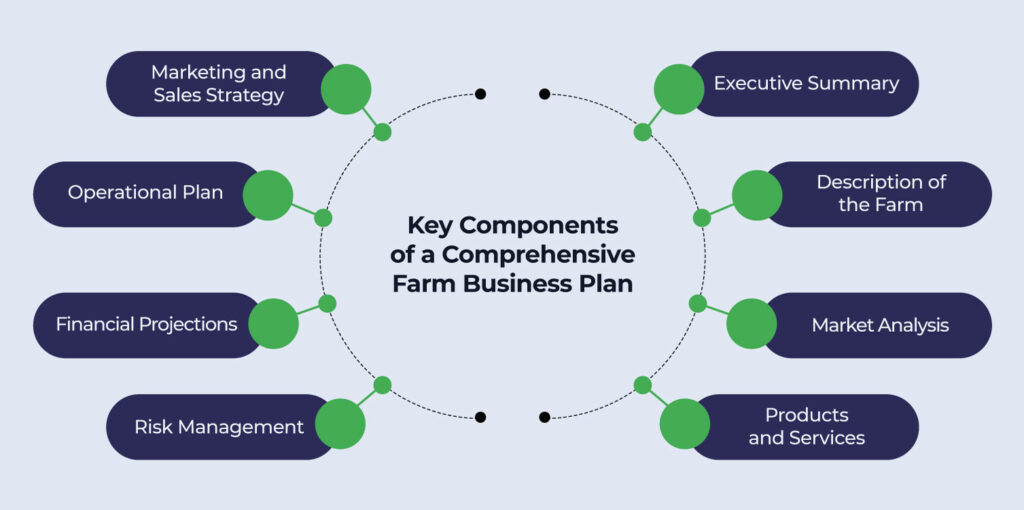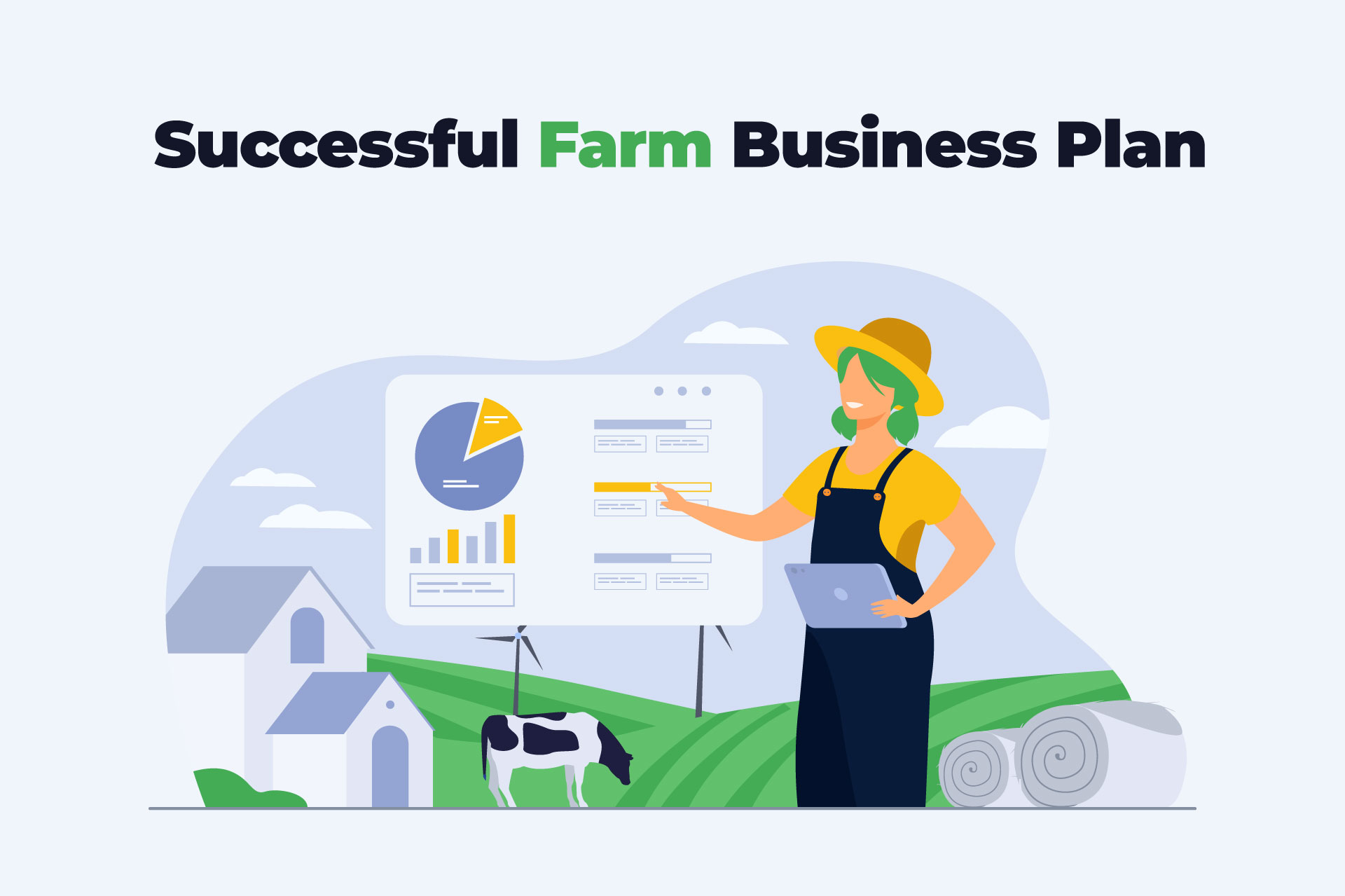Cultivating Success with a Comprehensive Farm Business Plan
Farm business planning involves outlining the goals, strategies, and financial projections for an agricultural operation. It serves as a roadmap that guides farmers in making informed decisions, managing resources effectively, and adapting to changing market conditions. A well-crafted farm business plan provides a clear direction for the farm’s future, enabling farmers to identify potential risks, capitalize on opportunities, and secure financing from lenders or investors.
Importance of a Farm Business Plan
Having a farm business plan is crucial for several reasons. Firstly, it helps farmers clarify their vision and set realistic goals for their agricultural enterprise. By clearly defining their objectives, farmers can focus their efforts on areas that contribute to their long-term success. Secondly, a farm business plan facilitates effective communication and collaboration with stakeholders such as partners, employees, and financial institutions. It ensures that everyone involved understands the farm’s mission, strategies, and financial expectations.
Furthermore, a business plan for farms enables farmers to identify potential risks and develop strategies to mitigate them. By conducting a thorough market analysis, farmers can anticipate market trends, assess consumer demands, and identify potential competitors. This information allows them to tailor their products and marketing strategies to meet the needs of their target audience effectively. Additionally, a farm business plan helps farmers plan their operational processes, including production schedules, supply chain management, and quality control, ensuring efficiency and productivity.
Key Components of a Comprehensive Farm Business Plan
Break down the essential sections that make up a comprehensive farm business plan. Provide an overview of each component and explain their significance in convincing investors.

Executive Summary
The executive summary is a concise overview of the entire farm business plan. It provides a snapshot of the farm’s mission, goals, strategies, and financial projections. This section should be compelling enough to capture the reader’s attention and generate interest in the rest of the plan.
Description of the Farm
In this section, you will provide detailed information about your farm, including its location, size, infrastructure, and history. Describe the type of farming you engage in (crop cultivation, livestock production, organic farming, etc.) and highlight any unique selling points or competitive advantages your farm possesses.
Market Analysis
Conducting a thorough market analysis is crucial to understanding the demand and competition in your target market. Identify your target customers, analyze their preferences and purchasing power, and evaluate the market trends that may affect your farm’s operations.
Products and Services
Detail the range of products and services your farm offers. Include information about the specific crops or livestock you produce, their quality, and any value-added products or services you provide, such as organic certification or agritourism activities.
Marketing and Sales Strategy
Outline your marketing and sales strategies for promoting and selling your farm products. Identify the channels you will use to reach your target customers, such as direct sales, farmers’ markets, online platforms, or partnerships with local restaurants or grocery stores.
Operational Plan
In this section, explain how you will manage the day-to-day operations of your farm. Outline the production processes, equipment and machinery required, labor needs, and any other relevant operational considerations.
Financial Projections
Develop comprehensive financial projections for your farm business. Include information on the initial investment required, projected revenue and expenses, cash flow statements, and profitability forecasts. This section will help you assess the financial viability of your farm and attract potential investors or lenders.
Risk Management
Identify the potential risks and challenges your farm may face, such as weather-related events, disease outbreaks, or market fluctuations. Describe the strategies and contingency plans you will put in place to mitigate these risks and ensure the continuity of your farm’s operations.
Steps to Create a Farm Business Plan
Creating a farm business plan may seem overwhelming, but breaking it down into manageable steps can simplify the process. Follow these steps to develop a comprehensive and effective farm business plan:
1. Define Your Goals and Objectives
Start by clarifying your long-term goals and objectives for your farm. What do you want to achieve in terms of profitability, sustainability, and growth? Having a clear vision will guide your decision-making throughout the planning process.
2. Conduct Market Research
Thoroughly research your target market to identify consumer demands, market trends, and potential competitors. This information will help you tailor your products and marketing strategies to meet the needs of your customers effectively.
3. Assess Resources and Infrastructure
Evaluate the resources and infrastructure available on your farm. Consider factors such as land availability, water sources, equipment, storage facilities, and labor availability. Assessing these resources will help you determine the scale and type of farming practices you can undertake.
4. Develop Marketing Strategies
Based on your market research, develop a comprehensive marketing strategy that outlines how you will promote and sell your farm products. Consider different marketing channels, such as online platforms, farmers’ markets, community-supported agriculture (CSA) programs, or direct sales to local businesses.
5. Outline Operational Processes
Describe the day-to-day operational processes required to run your farm. Include details about cultivation techniques, livestock management practices, quality control measures, and supply chain management. Consider any necessary certifications or licenses required for your specific farming practices.
6. Create Financial Projections
Develop realistic financial projections for your farm business. Calculate the initial investment required, projected revenue streams, and anticipated expenses. Consider factors such as production costs, marketing expenses, equipment maintenance, and labor costs. Regularly monitor and update these projections to track your farm’s financial performance.
7. Evaluate and Refine the Plan
Review and refine your farm business plan regularly. Seek feedback from trusted advisors, industry experts, or experienced farmers. Continuously monitor market trends and make adjustments to your strategies and projections accordingly.
Benefits of a Well-Developed Farm Business Plan
A well-developed farm business plan offers several benefits:
Guidance and Direction: A farm business plan provides a roadmap for your farm’s operations, helping you make informed decisions and stay focused on your goals.
Effective Communication: It facilitates communication and collaboration with stakeholders, including partners, employees, lenders, and investors, ensuring everyone is aligned with the farm’s vision and objectives.
Risk Mitigation: By identifying potential risks and developing contingency plans, a farm business plan helps you proactively manage risks and navigate unforeseen challenges.
Opportunity Identification: A thorough market analysis and competitive assessment enable you to identify emerging trends and opportunities in your target market, allowing you to adapt and seize new business prospects.
Financial Planning and Investment: A well-crafted financial projection helps you understand the financial feasibility of your farm business, attract potential investors or lenders, and secure the necessary funding for your operations.
Operational Efficiency: By outlining your operational processes, a farm business plan enables you to streamline your operations, improve productivity, and optimize resource allocation.
Long-Term Sustainability: A farm business plan encourages sustainable farming practices, ensuring the long-term viability of your agricultural enterprise while minimizing environmental impact.
Challenges in Farm Business Planning
While developing a farm business plan, farmers may encounter several challenges. It’s important to be aware of these challenges and develop strategies to overcome them:
Uncertain Market Conditions
Agricultural markets can be volatile, with unpredictable price fluctuations and changing consumer preferences. Farmers must stay updated on market trends, consumer demands, and potential disruptions to make informed decisions and adjust their strategies accordingly.
Climate and Environmental Factors
Farmers are highly dependent on weather conditions and environmental factors, such as rainfall, temperature, and soil quality. Climate change and extreme weather events can significantly impact crop yields, livestock health, and overall farm productivity. It’s important to incorporate climate resilience strategies into your farm business plan.
Access to Capital and Funding
Securing adequate financing for farm operations can be challenging, especially for small-scale or new farmers. Limited access to capital and funding sources may restrict the implementation of growth strategies or necessary investments in equipment, infrastructure, or technology. Exploring alternative funding options, such as grants, loans, or partnerships, can help overcome this challenge.
Examples of Successful Farm Business Plans
Looking at examples of successful farm business plans can provide valuable insights and inspiration for your own planning process. Take the time to study the approaches and strategies adopted by established farmers in your industry or region. Understand their marketing tactics, operational processes, and financial management techniques, and adapt them to suit your own farm’s unique circumstances and goals.
Ready to Create a Solid Farm Business Plan? Get Started Today!
Creating a well-crafted farm business plan is crucial for the success and sustainability of your agricultural venture. Whether you’re a small-scale farmer, a family-run farm, or an aspiring agribusiness entrepreneur, our team at Easy Capraise is here to help. We specialize in assisting businesses like yours in finding investors and securing the capital raising you need to bring your farm business to new heights.
Don’t miss out on the opportunity to maximize your farm’s potential. Contact us today and let our experts guide you through the process of creating a comprehensive farm business plan that will attract investors and set you on the path to success.
FAQs
Why is a farm business plan necessary?
A farm business plan provides a roadmap for your farm’s operations, helping you set goals, make informed decisions, secure funding, and adapt to market conditions.
How long does it take to create a farm business plan?
The time required to create a farm business plan depends on various factors, such as the farm’s complexity and your familiarity with the planning process. It can range from several weeks to a few months.
Can I use a template for my farm business plan?
Using a template as a starting point can be helpful, but ensure that you customize it to reflect your specific farm’s goals, strategies, and financial projections.
What should be included in the financial projections?
Financial projections should include initial investment requirements, projected revenue streams, anticipated expenses, and cash flow statements. It’s crucial to regularly monitor and update these projections to track your farm’s financial performance.
How often should a farm business plan be updated?
A farm business plan should be regularly reviewed and updated, at least annually or whenever significant changes occur in your farm’s operations, market conditions, or financial situation.
How do I start a farm business plan and Find a Farm Business Plan Sample?
Here’s a guide on how to start a farm business and where to find a sample farm business plan:
Identify your farm’s purpose and goals: Determine the type of farming you want to engage in and the specific goals you wish to achieve. This could include crop farming, livestock production, organic farming, or specialized farming practices.
Conduct thorough market research: Understand the demand and market potential for your chosen farming niche. Identify your target market, competitors, pricing trends, and any regulatory requirements specific to your area.
Determine your farm’s resources: Assess the resources you have available, such as land, capital, equipment, and labor. Determine if you need to acquire additional resources or secure financing for your farm business.
Develop a farm business plan: Create a comprehensive business plan that outlines your farm’s mission, vision, and strategies. Include sections on market analysis, production methods, operational plans, marketing and sales strategies, financial projections, and risk management.
Seek out sample farm business plans: There are various resources where you can find sample farm business plans to use as templates or references. Consider the following options:
a. Online resources: Many agricultural organizations, government agencies, and agricultural universities provide sample farm business plans on their websites. Search for “sample farm business plan” and explore the available resources.
b. Local agricultural extension offices: Visit your local agricultural extension office or cooperative extension service. They often have resources, workshops, and sample farm business plans tailored to your specific region.
Seek professional advice: If you need guidance in developing your farm business plan or need assistance customizing a sample plan, consider reaching out to Easycapraise.com.
Conclusion
Developing a comprehensive farm business plan is a vital step toward the success and sustainability of your agricultural venture. By outlining your goals, conducting thorough market research, assessing resources, and creating financial projections, you can create a roadmap that guides your farm’s operations and positions you for long-term success. Remember to regularly review and update your plan to adapt to changing market conditions and seize new opportunities. With a well-developed farm business plan in hand, you can navigate the challenges of the agricultural industry and achieve your desired outcomes.
Contact us
Good to have you here! If you have any queries, please leave your message. Our team will reach out soon:)
.








